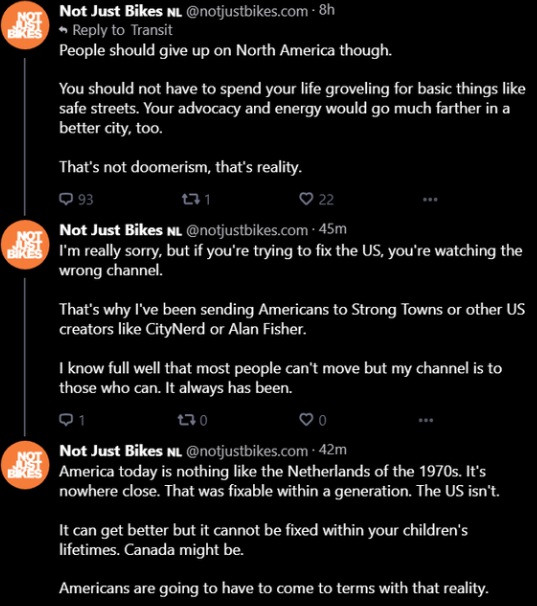view the rest of the comments
Fuck Cars
A place to discuss problems of car centric infrastructure or how it hurts us all. Let's explore the bad world of Cars!
Rules
1. Be Civil
You may not agree on ideas, but please do not be needlessly rude or insulting to other people in this community.
2. No hate speech
Don't discriminate or disparage people on the basis of sex, gender, race, ethnicity, nationality, religion, or sexuality.
3. Don't harass people
Don't follow people you disagree with into multiple threads or into PMs to insult, disparage, or otherwise attack them. And certainly don't doxx any non-public figures.
4. Stay on topic
This community is about cars, their externalities in society, car-dependency, and solutions to these.
5. No reposts
Do not repost content that has already been posted in this community.
Moderator discretion will be used to judge reports with regard to the above rules.
Posting Guidelines
In the absence of a flair system on lemmy yet, let’s try to make it easier to scan through posts by type in here by using tags:
- [meta] for discussions/suggestions about this community itself
- [article] for news articles
- [blog] for any blog-style content
- [video] for video resources
- [academic] for academic studies and sources
- [discussion] for text post questions, rants, and/or discussions
- [meme] for memes
- [image] for any non-meme images
- [misc] for anything that doesn’t fall cleanly into any of the other categories

Yeah, I don't think it's impossible to fix the US. Or frankly anything else. But possible and practical are very different things. It's possible, but it would take a massive amount of time, money, and political will that would have to basically come out of nowhere. It's not practical to expect that in the foreseeable future.
But just because we can't "fix" it doesn't mean we can't at least make improvements. Fixing isn't really a binary. Even if we can't do much for existing suburbs with their massive sprawl and absolutely nothing you can walk to, we can make city centers more walkable and expand public transit within them. We can avoid building more suburban sprawl. We can make walkability an important criteria for new neighborhoods. Even if we can't fix things for everyone, we can at least improve things for a significant number of people and that's absolutely doable.
My Canadian city has been improving in recent years. We got an LRT in the past 5 years or so and it's amazing if you're on its corridor (and that has prompted more and better development along it). We've added a bunch of bike lanes (proper ones with concrete barriers), removing car lanes in some cases. In our downtown, the sidewalks got expanded and street even closed to vehicles to be pedestrian only (and part of it is full of picnic tables and stalls for festivals). We still have a long way to go and the city still down have a bunch of suburban sprawl, but it is getting better and we should not give up on improving it.